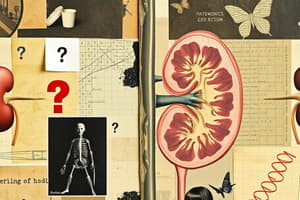Podcast
Questions and Answers
ที่ไหนในไตรวงสุดท้ายและท่อน้ำเหลืองที่ไตมีการขับออกสารเสียบางชนิดอย่างความเป็นไอออน (H+) และไอออนแอมโมเนียม (NH4+), และยาเข้าสู่ปัสสาวะ?
ที่ไหนในไตรวงสุดท้ายและท่อน้ำเหลืองที่ไตมีการขับออกสารเสียบางชนิดอย่างความเป็นไอออน (H+) และไอออนแอมโมเนียม (NH4+), และยาเข้าสู่ปัสสาวะ?
- ไกรฯ ทดลอง
- ไกรฯ กาดหาง (correct)
- ไกรฯ เจริญ
- ไกรฯ ประชุม
การบำรุงรักษาปริมาณเลือดและความดันโลหิตถูกทำโดยใด?
การบำรุงรักษาปริมาณเลือดและความดันโลหิตถูกทำโดยใด?
- การแพ้ระหว่างการถือเอา
- การหลอกหรือการขับ
- การขับออกของไต (correct)
- การร้อยเชื้อ
เพื่อการควบคุมความสมดุลของกรด-เบสในร่างกาย เชิงกรณีขณะร่างกายส่วนใด?
เพื่อการควบคุมความสมดุลของกรด-เบสในร่างกาย เชิงกรณีขณะร่างกายส่วนใด?
- การขับของไต (correct)
- การตั้งค่าระดับน้ำ
- การเพิ่มระดับความดันให้สูง
- การประมาณจำนวนว่าง ๆ
กรด-เบสในร่างกายถูกควบคุมโดยให้อัตราใด?
กรด-เบสในร่างกายถูกควบคุมโดยให้อัตราใด?
ฮอร์โมนที่ถูกผลิตโดยไตที่กระตุ้นการผลิตเซลล์เลือดแดงคือ?
ฮอร์โมนที่ถูกผลิตโดยไตที่กระตุ้นการผลิตเซลล์เลือดแดงคือ?
โรคไตเฉียบพลัน (CKD) เป็นโรคที่แบ่งเป็นระยะยาวและผัสพันธุ์ด้วยสถานการณ์ใด?
โรคไตเฉียบพลัน (CKD) เป็นโรคที่แบ่งเป็นระยะยาวและผัสพันธุ์ด้วยสถานการณ์ใด?
ในระบบขับถ่าย หลังจากเลือดเข้าสู่กลอเมอรูลัส สิ่งที่เกิดขึ้นคืออะไร?
ในระบบขับถ่าย หลังจากเลือดเข้าสู่กลอเมอรูลัส สิ่งที่เกิดขึ้นคืออะไร?
เมื่อท่อเปลือกของกลอเมอรูลัสทำหน้าที่ซึ่งขั้นตอน?
เมื่อท่อเปลือกของกลอเมอรูลัสทำหน้าที่ซึ่งขั้นตอน?
หลังจากได้ชื่อว่าของท่อเปลือก สิ่งที่เกิดขึ้นถัดมาคืออะไร?
หลังจากได้ชื่อว่าของท่อเปลือก สิ่งที่เกิดขึ้นถัดมาคืออะไร?
Nephron ประกอบด้วยส่วนหลักๆ คือกี่ส่วน?
Nephron ประกอบด้วยส่วนหลักๆ คือกี่ส่วน?
ท่อบุ๊คแมนของ nephron ใช้ในการทำหน้าที่ใด?
ท่อบุ๊คแมนของ nephron ใช้ในการทำหน้าที่ใด?
หากต้องการป้องกันการสูญเสียของโพรตีนจากร่างกาย จะต้องใช้กระบวนการใด?
หากต้องการป้องกันการสูญเสียของโพรตีนจากร่างกาย จะต้องใช้กระบวนการใด?
Flashcards are hidden until you start studying
Study Notes
The Excretory System: A Focus on Kidneys
The excretory system is a crucial network of organs and processes that work together to eliminate waste, regulate body fluids, and maintain overall homeostasis. At the heart of this system lie the kidneys, two bean-shaped organs that continue to amaze us with their intricate functions.
Kidney Anatomy and Structure
Each kidney is about the size of a fist, weighing about 125–170 grams in an adult human. They are located in the upper abdominal cavity, one on each side of the spine, protected by the ribcage. The kidneys are composed of several million nephrons, the functional units of the kidney, which filter the blood and produce urine. A nephron consists of a renal corpuscle (glomerulus and Bowman's capsule), tubules, and the collecting duct.
Kidney Functions
-
Filtration: Blood enters the glomerulus, a dense network of capillaries, where a semi-permeable membrane allows small molecules and water to pass into the Bowman's capsule, forming a filtrate. This filtrate contains waste products, excess ions, and water that the body no longer needs.
-
Reabsorption: The filtrate, now called tubular fluid, moves through the proximal convoluted tubule, the loop of Henle, and the distal convoluted tubule. During this journey, essential molecules such as glucose, amino acids, and water are reabsorbed back into the bloodstream, while waste products and excess ions are left behind.
-
Tubular secretion: In the distal convoluted tubule and collecting duct, the kidneys actively secrete certain waste products, such as hydrogen ions (H+) and ammonium ions (NH4+), and medications, into the urine.
-
Regulation of body fluids: The kidneys also regulate the body's water and electrolyte balance. By selectively reabsorbing or secreting water and ions, the kidneys help maintain proper blood volume and blood pressure.
-
Acid-base balance: The kidneys regulate the body's acid-base balance by excreting excess acid and retaining bicarbonate ions. This process helps maintain the body's pH within a narrow range of 7.35-7.45.
-
Production of hormones: The kidneys produce hormones such as erythropoietin (EPO), which stimulates red blood cell production, and renin, which plays a role in blood pressure regulation.
Kidney Disease and Chronic Kidney Disease (CKD)
Kidney diseases can be acute or chronic and affect the kidneys' ability to filter blood and maintain homeostasis. Chronic kidney disease (CKD) is a long-term, progressive condition characterized by a gradual decline in kidney function, eventually leading to kidney failure, which requires dialysis or a kidney transplant.
Factors That Affect Kidney Health
Several factors can negatively impact kidney health, including:
- High blood pressure
- Diabetes
- Smoking
- Obesity
- Infections
- Dehydration
- Use of certain medications
Conclusion
The kidneys are vital organs that, along with the excretory system, help maintain homeostasis and ensure the body's waste products are removed efficiently. By understanding the kidneys' complex functions, we can appreciate the importance of maintaining good kidney health and avoiding factors that may harm them. In doing so, we can help prevent chronic kidney disease and promote overall wellness.
Studying That Suits You
Use AI to generate personalized quizzes and flashcards to suit your learning preferences.




